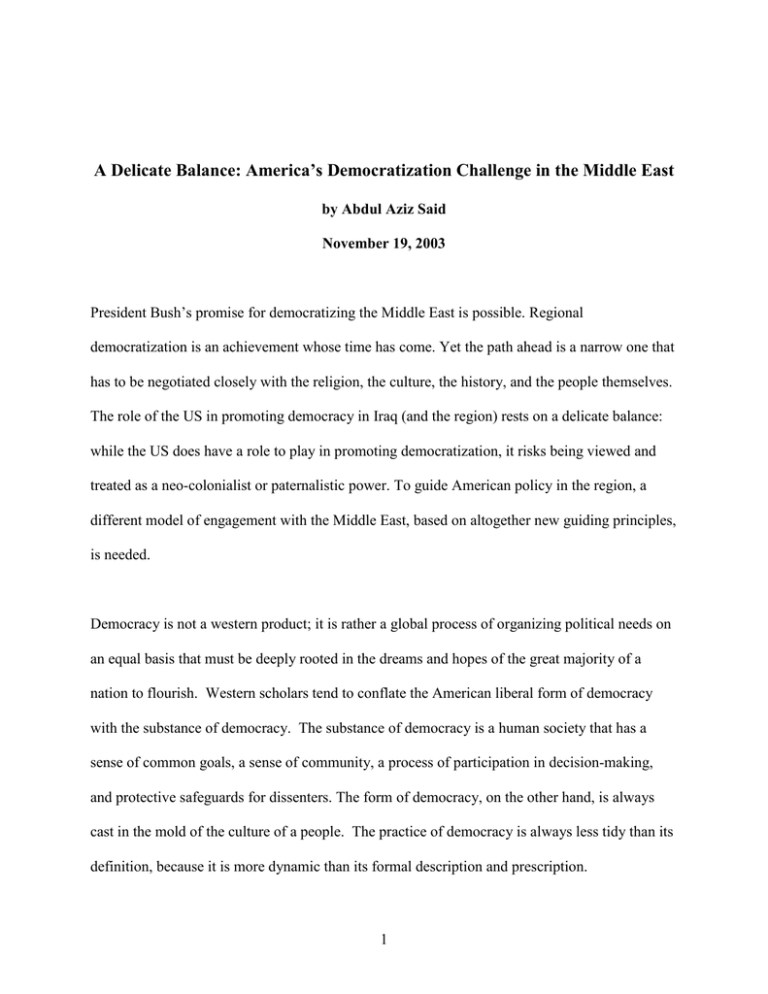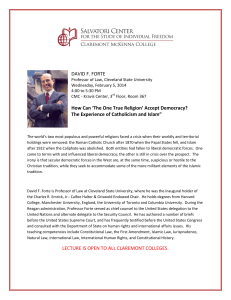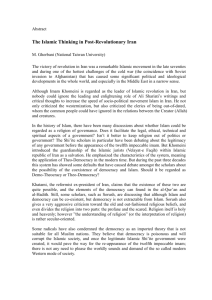A Delicate Balance: America’s Democratization Challenge in the Middle East
advertisement

A Delicate Balance: America’s Democratization Challenge in the Middle East by Abdul Aziz Said November 19, 2003 President Bush’s promise for democratizing the Middle East is possible. Regional democratization is an achievement whose time has come. Yet the path ahead is a narrow one that has to be negotiated closely with the religion, the culture, the history, and the people themselves. The role of the US in promoting democracy in Iraq (and the region) rests on a delicate balance: while the US does have a role to play in promoting democratization, it risks being viewed and treated as a neo-colonialist or paternalistic power. To guide American policy in the region, a different model of engagement with the Middle East, based on altogether new guiding principles, is needed. Democracy is not a western product; it is rather a global process of organizing political needs on an equal basis that must be deeply rooted in the dreams and hopes of the great majority of a nation to flourish. Western scholars tend to conflate the American liberal form of democracy with the substance of democracy. The substance of democracy is a human society that has a sense of common goals, a sense of community, a process of participation in decision-making, and protective safeguards for dissenters. The form of democracy, on the other hand, is always cast in the mold of the culture of a people. The practice of democracy is always less tidy than its definition, because it is more dynamic than its formal description and prescription. 1 There is no fundamental incompatibility between Islam and democracy. The lack of democracy in the Middle East is due more to a lack of preparation for it than to a lack of religious and cultural foundations. In addition to social functions, Islam serves a practical role in politics by offering recourse to a transcendental order to which rulers can be held accountable. The oppressed can defend their rights by appealing to religious standards. Islam offers a vocabulary of resistance to corruption and repression, and a vocabulary of hope for the cultural future. Just as there has been and continues to be a stamp of Calvinism on American culture, so to there is a stamp of Islam on Middle Eastern cultures. Modernization theory and Western scholarship on democracy have been somewhat misleading in the projections of cultural change in the West. Religion has not been simply left behind or rendered obsolete by modernization even when religion has been rejected there has emerged new satisfiers – nationalism, the market economy and cultural triumphalism. It is particularly self-defeating to exclude Islamic extremists if they are willing to participate in democratic politics. The central issue raised by extremist movements – the failure of development in the region – is legitimate. By repressing extremist voices, existing elites force the Islamic impulse into narrower channels characterized by violence. Instead, the United States should encourage Middle Eastern governments to create the space necessary to dialogue with extremists and engage their core concerns and grievances. Muslim extremists do not represent a genuine revival of Islam, but rather a negativism that identifies closely with an ‘enemy’. What is required is an Arab alternative that is neither a superficial compromise nor a schizophrenic reaction, but rather a response based on Islamic values which 2 reflects the historical development of Islam and responds to the challenge of contemporary life. Mainstream Islam can regain the moral high ground and emotional momentum from extremists. This can be done when Arabs and Muslims gain self-respect as full-fledged citizens of the modern world. Western democracies emerged after years of deep introspection, existential anxiety and conflict over its faith system with hard-won lessons and achievements in the realm of political coexistence. Muslims are not required to reach the same conclusions that Christians adopted with regard to their faith, and do not need to in order to develop an authentically Islamic response to political empowerment. There is a great need in the Muslim and Arab world to deliberately integrate the person, the citizen and the Muslim. This involves a search for truth within Islamic traditions and contexts that begins at the level of the individual. Christianity has emerged with a close linking of personal behavior with citizenship and social values, while Muslims today are on the threshold of discovering the obligations and meaning of Muslim citizenship. The United States can facilitate this process by sponsoring and engaging in dialogues that nurtures a renewed understanding of individuality in community. Rather than an American monologue, the United States can begin by asking key questions that empower Middle Easterners to define what they want – to flesh out the answer to the question: “What does democracy look like for us (form and substance)?” Education and the media will play a critical role in the transition process. Both are necessary for the indigenous development of democracy. 3 Arabs and Muslims must also ask themselves: what kind of citizens can their societies create, animated by Islamic values and contexts? What kind of solutions can Islam bring to affect participatory decision-making in the absence of authoritative guidance in social matters? What Islamic values and social mechanisms can be brought to bear for ameliorating the poor economic conditions of modern, urban living? The flowering of the individual as citizen within Islamic community can inspire new avenues of meaning and institutions that testify to - and fortify what is enduring in Islam. Islamic social institutions are more dynamic and variegated than is widely recognized, and provide the basis for genuine participation at the social and political level. It is the Muslim community itself that must discover how this integration can apply to modern living, and in the process discover original ways of implementing Islamic precepts in changing social conditions. Muslims have the right to participate in the unfolding and direction of their community, while creating their own values and terms within the enduring context of Islam. Democracy is not built upon a particular variety of electoral institutions, but upon genuine participation. In this regard there are democratic precepts in Islam, as there are in other religions, to include both the preservation and development of the community, and social justice and consultative mechanisms. There are also Islamic traditions, as in other religions, that in practice result in transgression against those ideals. Democracy is an indigenous and delicate flower that only flourishes when deeply rooted in the dreams and hopes of the great majority of a nation. Today’s challenge for Arabs and Muslims lies in the expansion of the original ideas of Islam, and a willingness to demonstrate curiosity about historical experiences and achievements of the 4 West. Where are the Muslim ‘Lawrence of Arabias’ who seek to discover and know the Western Christian worldview? Why has there been so little research among Muslim scholars on the Christian perspective of the Western experience, or the encyclicals of the Catholic Church, or the Christian struggle to find religious meaning in politics? Much may be gained in insight from the historical political trials of Christianity for Muslims at this time, as it emerged at a time of profound oppression, injustice and during occupation. How did this path cope with such circumstances, organize their community and move beyond them? Democracy cannot be installed by a military coup any more than by a so-called “White Revolution” from the top. Democratic behavior is a learned behavior, and democracy can be learned only by practice. While repressive regimes can be imposed by subversion, democracy cannot be successfully implanted from the outside, and certainly not by subversive means: it is an indigenous process rooted in the active participation of a broad spectrum of citizens in the political process. Admittedly, the United States experienced false starts in building democracies, beginning with Wilson and his idealism. Succeeding US presidents have displayed timidity and an absence of vision. They have lacked a sense of strategy. Their efforts have been seen as reactive, pro-status quo, personality-based, and elitist: building a global elite network of the rich and powerful, dependent upon the American rich and powerful. This persisted throughout the Cold War, where US presidents operated according to a prescribed colonialist mentality that justified friendly, authoritarian regimes on the grounds that these non-Western societies were “not ready” for democracies. 5 Today, the United States treads a narrow path: there is a need for a new beginning in the Arab World. Here is an opportunity for the United States to demonstrate its commitment to universal democratic ideals by engaging in a substantive dialogue with a population traumatized by years of brutal political oppression. In the process, the United States may be surprised to find the degree to which the Middle East has nurtured hope for a genuine opportunity for selfdetermination and empowerment. Once a dialogue has begun that extends beyond elites, we will witness not only a transformation in our relationship and understanding of one another, but the emergence of true leadership that thrives by the flourishing of others. 6





